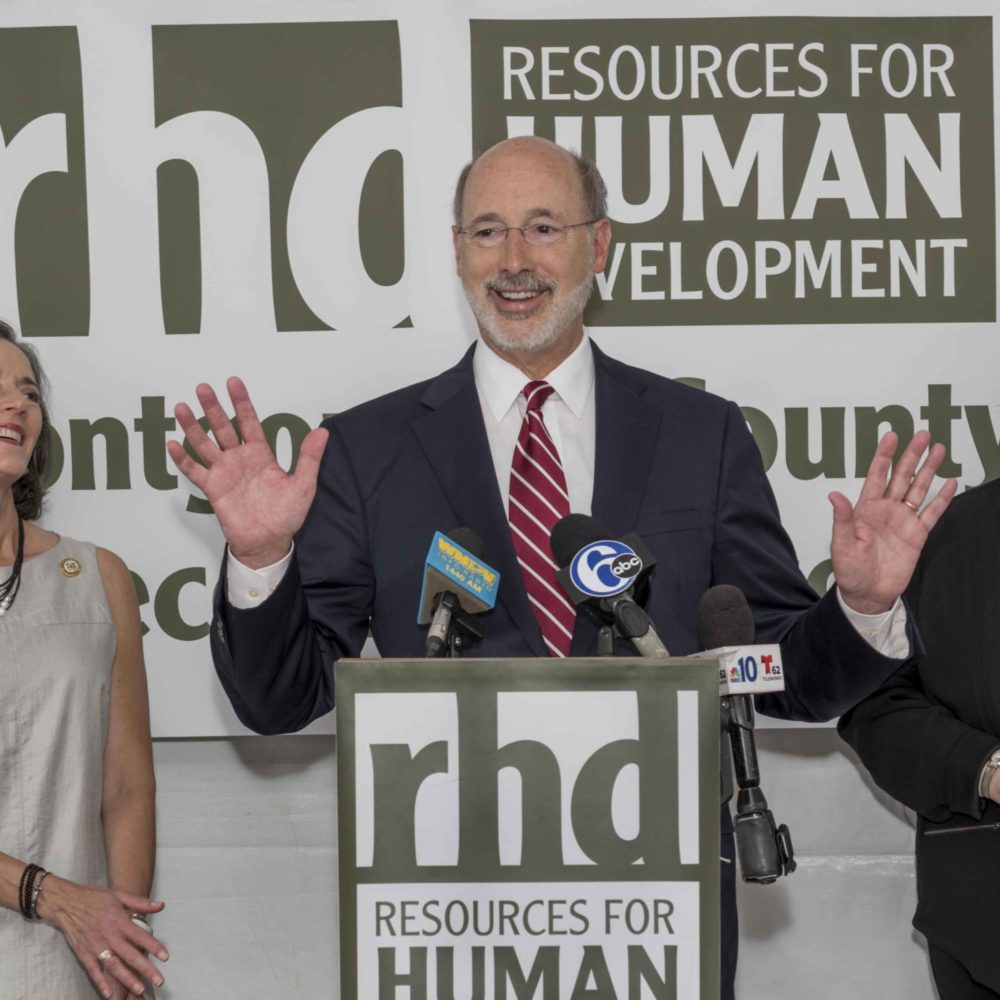
Center of Excellence
RHD welcomed Pennsylvania Governor Tom Wolf to the RHD Montgomery County Recovery Center, as Gov. Wolf and the Department of Human Services officially named MCRC a “Center of Excellence.”
Becoming a Center of Excellence as part of Pennsylvania’s expansion of addiction recovery treatment will allow MCRC to offer more and better treatment to Pennsylvanians with opioid-related substance use disorder. MCRC was one of 20 Centers of Excellence opened by DHS this year.
RHD founded the Center as the Montgomery County Methadone Center in 1972. For 44 years that program has provided Medication Assisted Treatment to individuals dealing with opioid addiction.
 See more photos from the event.
See more photos from the event.
“RHD has long been at the forefront of innovative, person-centered programs for people in addiction recovery and we’re thrilled to see this program recognized for its excellence of service and dedication to the people of Pennsylvania,” RHD CEO Dyann Roth said. “As part of our plans for the Center of Excellence, we are converting the name to the Montgomery County Recovery Center, as that better reflects our commitment to the whole person and how MCRC helps people on their journey of recovery.
“This would not be possible without the tireless efforts of our amazing staff, led by director Marie McCartney. They make hope and recovery possible. Their work can feel overwhelming and at times thankless, but what they’re doing is changing lives and saving lives every single day.”
“We are honored to join a community of providers fighting the national opioid epidemic,” said Linda Donovan-Magdamo, Executive Vice President of RHD’s Pennsylvania Behavioral Health & Housing Division. “RHD’s Montgomery County Recovery Center is committed to participating actively in the learning network collaborative that arises out of this initiative, and we’re thrilled to see MCRC recognized for its excellence of service and dedication to the people of Pennsylvania.”
MCRC supports more than 300 individuals each day, with an experienced team in place that provides treatment in conjunction with counseling and supportive services, and has a well-established Continuous Quality Improvement protocol, with a committee that includes professionals and consumer advocates. The population served includes those with co-occurring mental illness and substance use disorders, and MCRC provides specialized treatment for pregnant/post-partum women.
Centers of Excellence help ensure that people with opioid-related substance use disorder rapidly connect to treatment, stay in treatment to receive follow-up care, and are supported within their community. Care management teams coordinate care and provide transitions to new parts of the treatment process. Rather than just treating the addiction, Montgomery County Recovery Center and other Centers of Excellence will treat the entire person through team-based treatment, with the explicit goal of integrating behavioral health and primary care and, when necessary, evidence-based medication assisted treatment.
“This is a wonderful opportunity implement a holistic approach to service, and enhance MCRC’s commitment to care for the whole person,” Montgomery County Recovery Center director Marie McCartney said. “This award from DHS will double the capacity of our program, expanding the essential services we offer to people in our community who are in dire need of support. For 44 years, MCRC staff have supported Pennsylvanians from all socio-economic levels in their journey of recovery. We do this work in partnership with Montgomery County DBH, Probation and Parole, Drug Court, Magellan and a community of dedicated advocates and treatment providers throughout the State.”
MCRC has an experienced team in place that provides counseling and supportive services, and has a well-established Continuous Quality Improvement protocol, with a committee that includes professionals and consumer advocates. The population served includes those with co-occurring mental illness and substance use disorders, and MCRC provides specialized treatment for pregnant/post-partum women. The Center also offers HIV/AIDS testing and counseling and TB testing for all participants. MCRC staff regularly coordinates Medication Assisted Treatment with primary healthcare providers and the program maintains working relationships with a variety of other Drug and Alcohol and Mental Health Treatment providers.
The current path of treatment for people who have opioid-related substance use disorders can be confusing and difficult to navigate. The links between behavioral health treatment and physical health treatment are often broken or not made at all. This means people may drop out of treatment after they receive care for their physical symptoms, bypassing critical components of care such as behavioral therapies and connection to community supports that can lead to meaningful recovery from substance use disorder.
The Centers of Excellence are a central, efficient hub around which treatment revolves. These centers will have navigators to assist people with opioid-related substance use disorders though the medical system, and ensure they receive behavioral and physical health care, as well as any evidence-based medication-assisted treatment needed.
“Since opioids are so powerful, those who try to recover need different types of help in order to beat the disease. In fact, this approach has gained huge momentum as the most modern and successful way to support recovery, especially from opioids,” said DHS Secretary Ted Dallas. “The intense cravings, detoxification, and withdrawal symptoms involved in quitting make addiction difficult to overcome. As our strategy involves both behavioral therapy and FDA approved medication that individuals take to help curb cravings and manage withdrawal symptoms, it can improve the odds of recovery.”
The Department of Drug and Alcohol Programs will license the COEs as drug and alcohol providers that provide one of the three FDA-approved medications.


